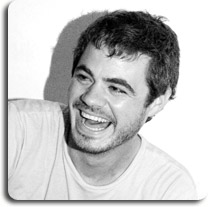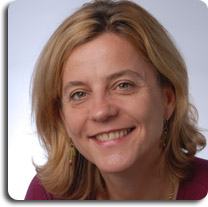 Scott Harrison spent 10 years promoting chic events in New York City, but the lifestyle left him feeling selfish and empty. So he did what any late-night party type would do: he founded an innovative organization that provides clean water to communities in developing nations throughout the world. 1 billion people lack clean water to drink. But so far, charity: water has funded more than 2,500 water projects in 16 developing nations. Those projects will provide over 1,100,000 people with clean, safe drinking water. That’s cooler than any party we’ve ever been to.
Scott Harrison spent 10 years promoting chic events in New York City, but the lifestyle left him feeling selfish and empty. So he did what any late-night party type would do: he founded an innovative organization that provides clean water to communities in developing nations throughout the world. 1 billion people lack clean water to drink. But so far, charity: water has funded more than 2,500 water projects in 16 developing nations. Those projects will provide over 1,100,000 people with clean, safe drinking water. That’s cooler than any party we’ve ever been to.
TILE: Why should young people care about clean water?
Scott: Most of us never have to think about where our water comes from. We take it for granted, that we can turn on the faucet and it’s there. But right now, almost a billion people on the planet don’t have access to clean, safe drinking water. That’s one in eight of us. It’s a big problem – but there are simple solutions that can help change it.
It’s really up to all of us, all ages, to help. But I think there’s a unique connection with young people. 4,500 kids a day die from water-related illnesses. And half the world’s schools don’t have clean water or sanitation. When we tell kids this, they’re devastated. We’ve had kids raise tens of thousands of dollars to help build clean water projects all on their own. The will of young people that try to imagine living like the almost one billion without water is incredible. And I really believe that if young people act now, they can see the water crisis end in their lifetime.
TILE: How did you get started in this work?
Scott: I worked years as a nightclub promoter in New York until I finally realized that I was an incredibly selfish person and I couldn’t keep denying my responsibility to give back to the world. I served as a volunteer photographer on a ship that provided surgeries and medicine to people on the coast of Liberia. My experience there changed my life forever. Many of the diseases we saw on the hospital ship were a direct result of contaminated water and lack of sanitation. So I made it my mission to provide clean and safe drinking water to those in need.
TILE: What’s the most important factor that influences whether someone has access to clean water?
Scott: There are many. Money and lack of infrastructure, mostly. Much of the world’s clean water resides right under us, in aquifers too deep in the ground to access with a simple shovel. Some areas, like many in East Africa, require digging deep boreholes – it’s an expensive project that governments don’t (or can’t) provide and local people don’t have the money to invest in. But once these deep water wells are drilled, the pumps can be maintained by the communities, which can collect minimal dues and take care of the spare parts and small repairs.
For other communities, lack of education or training limits safe water access. Take Cambodia, for example, where there is plenty of groundwater, but most of it is too contaminated to drink. Here, we help fund reliable filtering technologies that purify groundwater to be safe enough to use. Our program requires training and the families construct the filters themselves so they know how they work.
TILE: What’s the best advice you would give to your teenage self?
Scott: Go travel. It’s the most immediate and effective way to open up your mind and educate yourself on what’s going on in the world. If you don’t have the opportunity to travel, take advantage of everything that the Internet has to offer. Watch videos and documentaries, follow people you admire or can learn from on Twitter, keep up with them on Facebook. Technology has given us the chance to connect with people all over the world like we never could before. Tap into this. Figure out which issues ignite something in you.
TILE: How do you think young people can play a role in the changing landscape of philanthropy?
Scott: Young people want to actively participate. They don’t want to just write a check and call it good. They want to get deeply involved with what we do. One example – a nine-year-old girl named Riley Goodfellow from California. She asked her friends, family and church to help her fund a water project – she ate beans and rice for four months to prove she was serious – and ended up raising enough money for three (that’s more than $15,000). She’s not alone. Last September, we built a fundraising site to make it easy for people like Riley to join our mission. And since then, they’ve raised more than $2.5 million, all for clean water projects.
So how important are young people in changing philanthropy? Crucial. They get it done. They need little direction when they have passion for what they do. They just take care of it. The tens of thousands of mycharity: water members prove this. Every day, we’re excited to see more and more young people come up with creative ideas to fundraise for water projects. They’re changing the face of philanthropy by involving their personalities and their hobbies in giving and by trying to connect with those they help. It’s so exciting to see.
>> TILE brings you exclusive opinions, explanations, and interviews from experts in every industry. To read more, click on Ask the Experts in the TILE Library.
Have a burning question or an expert you’d like to see interviewed? Just Ask TILE!
 Yvette Alberdingk Thijm is the Executive Director of
Yvette Alberdingk Thijm is the Executive Director of  Scott Harrison spent 10 years promoting chic events in New York City, but the lifestyle left him feeling selfish and empty. So he did what any late-night party type would do: he founded an innovative organization that provides clean water to communities in developing nations throughout the world. 1 billion people lack clean water to drink. But so far, charity: water has funded more than 2,500 water projects in 16 developing nations. Those projects will provide over 1,100,000 people with clean, safe drinking water. That’s cooler than any party we’ve ever been to.
Scott Harrison spent 10 years promoting chic events in New York City, but the lifestyle left him feeling selfish and empty. So he did what any late-night party type would do: he founded an innovative organization that provides clean water to communities in developing nations throughout the world. 1 billion people lack clean water to drink. But so far, charity: water has funded more than 2,500 water projects in 16 developing nations. Those projects will provide over 1,100,000 people with clean, safe drinking water. That’s cooler than any party we’ve ever been to.